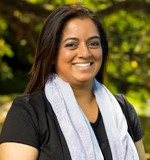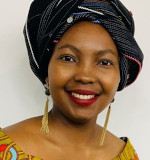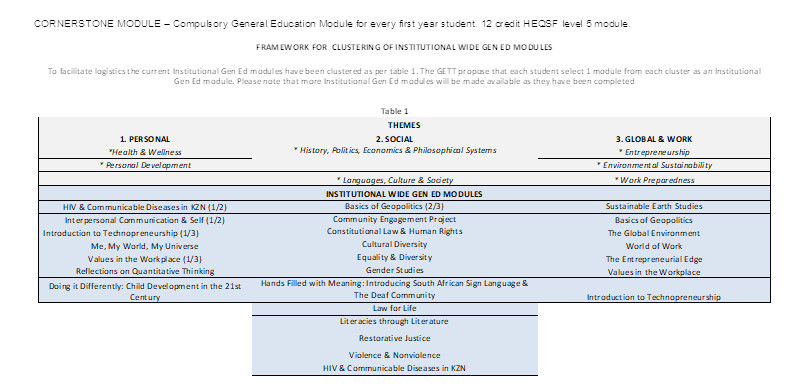Welcome to the Centre for General Education!
About General Education (GenEd)
During the Curriculum Renewal Project, it was envisioned that the curriculum and pedagogy at DUT must be intentionally designed to prepare our graduates for employment, while simultaneously preparing them for critical citizenship in an emergent and still fragile democracy. The introduction of General Education (GenEd) into the DUT curriculum was a key initiative of the strategic project on Curriculum Renewal which aimed to provide students with the general knowledge and skills necessary to actively participate in discourses that shape local, national, professional, and global communities.
The main responsibility of the Centre for General Education is to ensure that the principles and philosophy on which General Education was introduced into all DUT qualifications is realised to its full potential. The Centre is responsible for overseeing the delivery of 30 Institutional General Education (IGE) modules across the seven delivery sites of DUT.
The primary objective of the various modules offered by the Centre for General Education is to develop our students to be more reflective about their beliefs and choices, more self-conscious and critical of their presuppositions and motivations, more perceptive of the world around them, and more informed about the issues that arise in their lives, personally, professionally, and socially. The underpinning humanistic and transformative philosophy of our teaching approach provides the students with an opportunity to critically engage with contemporary issues and debates and to reflect on issues of citizenship and social justice. Its goals are to help students think critically, develop values, understand traditions, respect diverse cultures and opinions, and most importantly, put that knowledge to use.
Aims of General Education at DUT
- To build a student-centred educational experience embedded in the local context.
- To prepare students for an increasingly diverse and complex globalised work environment.
- To cultivate an engaged and critical citizenry in the context of an emerging and fragile democracy in an ever-changing world order.
The Centre for General Education is responsible for:
- Effective delivery of the IGE modules residing in the Centre.
- Promoting the underpinning humanistic and transformative philosophy of GenEd by ensuring that module delivery provides the students with an opportunity to critically engage with contemporary issues and debates and to reflect on issues of citizenship and social justice.
- Promoting Research in high impact practices in Teaching, Learning and Assessment aligned to transformative education pedagogy.
- Development of new IGE GenEd modules that will contribute to the Envision 2030 Strategy.
- Ensuring the development and implementation of department and faculty based GenEd modules are aligned with the approved institutional guidelines, and GenEd requirements.
- Development of policies in relation to GenEd where applicable.
- Monitoring and Evaluation of the implementation of General Education in collaboration with the Centre for Quality Promotion and Assurance (CQPA).
GenEd staff

Dr Juliet Ramohai |
Position: Head of Department and Senior Lecturer (DBN Campus) Courses Teaching: World of Work 101 Research Interests: Gender identities in education; specifically, black women in higher education: access and successful participation in institutions of higher learning, mobility into leadership positions, and their success. Behavioural challenges for the girl child in residential youth care centres (specifically adolescents) and the support needed for their successful reintegration into communities. Email: NthunaR@dut.ac.za |

Dr Anusharani Sewchurran |
Position: Lecturer (PMB Campus) Courses Teaching: Cornerstone 101; Equality and Diversity 101 Research Interests: Political economy of media; Digital humanities and 4IR; Decoloniality; Afrofuturism and contextual Archiving. Email: AnusharaniS@dut.ac.za |

Dr Benita Bobo |
Position: Lecturer (DBN Campus) Courses Teaching: Cornerstone 101, Gender Studies 101 Research Interests: Community Engagement in Higher Education; Community Development; Community Psychology; Gender Studies; Education; Social Justice; Transformative Learning Email: AzolaB@dut.ac.za |

Mr Gift Khumalo |
Position: Lecturer (DBN Campus) Courses Teaching: Cornerstone 101, Restorative Justice 101 Research Interests: Adolescents’ Psychosocial Wellbeing, School Social Work, Education, Students Support, Counselling, Mental Health Email: GiftK@dut.ac.za |
|
Mariah Naidoo |
Position: Admin Assistant (DBN Campus) Email: MariahN@dut.ac.za |

Dr Nosipho Makhakhe |
Position: Senior Lecturer (DBN Campus) Courses Teaching: Cornerstone 101, Basics of Geopolitics 101 Research Interests: Social scientist and health promotion specialist. Intervention mapping and implementation, community participatory research, HIV research among key and vulnerable populations (sex workers, men who have sex with men, long distance truck drivers, adolescent girls and young women). Email: NosiphoM8@dut.ac.za |
|
Siyabonga Shangase |
Position: Admin Assistant (PMB Campus) Email: SiyabongaS3@dut.ac.za |

Zandile Masango-Muzindutsi |
Position: Lecturer (DBN Campus) Courses Teaching: Cornerstone 101 Research Interests: Public mental health interventions; Social justice and social integration; Community psychology; Participatory research; Positive psychology Email: ZandileM5@dut.ac.za |
Courses
The Centre for General Education is responsible for the delivery of the Institutional General Education Modules listed below. Other General Education Modules are serviced by other departments within DUT. A list of these modules can be found below:

The following Institutional General Education Modules are delivered by the Centre:
Basics of Geopolitics (BGEP101)
The aim of this module is to provide students with the geopolitical skills and knowledge needed to succeed in a global world both academically, professionally and personally.
Topics included in the Basics of Geopolitics module include:
- Basics Concepts of Geopolitics (Power, Space, and Time)
- The North-South Perspective
- The East-West Perspective
- The Fight for Resources
- The Role of Religions
- Bombs and Guns
- The New Giants
- Beyond Planet Earth
Cornerstone (CSTN101)
Students in this module will learn how to share their knowledge and participate in the community of higher education, with values and practices that promote self-awareness, social justice and environmental awareness.
Topics covered in the Cornerstone module include:
- Issues of Identity
- The journey
- Gender
- HIV/AIDS
- Skills needed within a university
- Values
Equality and Diversity (EQDV101)
The purpose of this module is to enable students to appreciate diversity in self, others and society, and to participate in the development of equality and mutual respect in their communities. The impact of prejudice, stereotypes and discrimination is described in relation to individual development and social harmony. Socio-historical and legal frameworks related to equality and diversity are outlined to enable agency in students.
Gender Studies (GNST101)
The Gender Studies module is a service-learning module that seeks to develop knowledge, skills, attitudes and values, which promote equity and equality in society and the workplace, in accordance with human rights provisions of the South African Constitution and other local, regional and international commitments.
Learning outcomes
- Examine gender as a social construct
- Describe the intersection of gender, socio-economic factors and cultural practices
- Critically analyse the portrayal of women in the media
- Identify ways in which to promote positive working relationships based on equity and respect
Leadership (LDSH101)
The aim of this module is develop students with a critical and informed understanding of leadership, and with skills that enable them to understand and take ethical leadership in a variety of contexts, including within the institution.
Topics included in the Leadership module include:
- Negotiation of ground rules
- Developing of questions and goals for learning
- Existing experience of leadership
- Basic concepts and theories of leadership
- Preparing for community engagement
- Case studies of leadership – engagement with leaders from different context
Restorative Justice (RSJS101)
The purpose of the module is to equip students with knowledge and skills to contribute to a peaceful, non-violent society.
On completion of this module, the student will be able to:
- Explain the concept of restoration, and compare a restorative approach to the retributive approach
- Describe the indigenous and spiritual roots of restorative approaches
- Identify and describe restorative philosophy and various restorative practices
- Evaluate the appropriateness of a restorative approach in the South African context
- Demonstrate a restorative approach to situations of conflict
Social Responsibility & Sustainable Community Development (SRSC101)
This module is intended to provide students with both theoretical as well as practical insights on what it means to be a socially responsible citizen and actively contribute towards sustainable community development initiatives for both the local and global context.
Topics covered in this module include:
- Social Responsibility (including Individual Social Responsibility and Corporate Social Responsibility)
- Social Ethics
- Citizenship & Democracy
- Public Participation
- Human Rights & Civil Rights
- Community Development
Violence and Non-Violence (VNVL101)
The purpose of this module is to develop students’ awareness of self and society through engaging with text and lived experiences related to violence and nonviolence. It is also to develop students’ practice of critical and engaged citizenry; to challenge the ways in which violence serves to deepen inequality between social groups, in particular between men and women; to develop students’ understanding of the nature, extent and causes of violence; and to enable students to become active leaders for nonviolence within their roles as students and citizens.
World of Work (WWRK101)
The aim of this module is to ensure that our graduates are not only skilled professionals in their chosen area of study but also broadly educated and well-rounded local and global citizens. This module is designed to introduce and develop non-technical working related competencies and values within students in order to facilitate easier adapting to the workplace in Work Integrated Learning (WIL) placements, and/or their future careers.
Topics included in the World of Work module include:
- Traditional and Modern CV Writing
- Who am I? (DISC, MBTI etc.)
- Job Searching
- Job Applications
- Networking
- Interviewing
- Body Language
- Verbal Communication
- Visual /Graphical Presentation
- What Is “Business”
Publications and Research
| Dr. Anusharani Sewchurran (née Govender)
|
Sewchurran, A., (2022). A cautious celebration: interrogating Ryan Coogler’s Black Panther as a work of Afrofuturism and Capital. In Special Edition – Alternation. (in press)
Sewchurran, A., (2022). Black Panther: a reception analysis. Image and Text. (in press)
David, K., and Sewchurran, A. 2022. Disruptive Technology: An Enabler to Support the Rehabilitation of Survivors in Post Conflict Societies. In Murithi, T., and Roestenburg-Morgan, I. Eds. Survivor-Centred Justice: Global Perspectives and Issues. Routledge (in press)
Pannach, F., Sporleder, C., May, W., Krishnan, A. and Sewchurran, A., 2021. Of lions and Yakshis. Semantic Web, 12 (2), pp.219-239.
Sewchurran, A. and Hofmeyr, B., 2020. A critical reflection on digital disruption in journalism and journalism education. Acta Academica: Critical views on society, culture and politics, 52(2), pp.181-203.
Sewchurran, A. and Pannach, F., 2020. Negotiating the possibilities digital humanities offers Media and Cultural Studies for Crisis Communication Adjustments in the time of COVID-19. In Learner and subject at the dawn of research-led teaching and learning in the time of COVID-19. Smit, J.A., Ndimande-Hlongwa, N., Mkhize, N., and Ramrathan, L. Eds. CSSALL publishers: Durban. 48-75.
Sewchurran, A. 2017. Digital divide, data trash and the commodification of information: discourses around the digital divide, Nelson, O., Salawu, A. and Ojebuyi, B.R. (eds) Impacts of the media on African socio-economic development, IGI-Global.
Sewchurran, A. 2017. Digital archiving as dance pedagogy. Conference proceedings, Confluences 9: Deciphering decolonisation in Dance Pedagogy in the 21st century, Cape Town. 12-14th July 2017.
Sewchurran, A. 2015. An elephant in sheep’s clothing? South Africa’s experience of Freedom of Information, Felle, Tom and Mair, John (eds) Freedom Fighters or Lazy Journalism? Critical reflections on freedom of information, Bury St Edmonds: Abramis
Govender, A. 2009. Community Radio in KZN: an idealized public sphere, Hyde-Clarke, Nathalie (ed.) Citizen Journalism and Alternative Avenues of Communication, Claremont: Juta Maskanda and the Professor. (2023) Directed by Kathryn Olsen. [Documentary] Durban: NIHSS/DUT/UKZN/UNIZUL. (Sewchurran A: Researcher)
|
| Dr Benita Bobo
|
B Bobo & Z Masango-Muzindutsi (2022). Using a transformative learning pedagogy remotely: Reflections of early career academics in the context of COVID-19. In R. Govender & A. Jacobs (Eds.) Critical Reflections on Professional Learning During COVID-19: Context, Practice and Change (pp. 275 – 288). https://doi.org/10.51415/DUT.48
B Bobo & J Akhurst (2022). “Okokuqala ngokuya ndandiqala kwakungekho easy”: Feeling empowered to take collective action through community engagement. Journal of Community & Applied Social Psychology, 1– 11. https://doi.org/10.1002/casp.2659
J Akhurst, L Wilbraham, L Saville Young & B Bobo (2022), “Case Studies of Community-Based Service Learning in Honors Psychology at Rhodes University, South Africa”, Sengupta, E. and Blessinger, P. (Ed.) International Case Studies in Service Learning (Innovations in Higher Education Teaching and Learning, Vol. 47), Emerald Publishing Limited, Bingley, pp. 11-26. https://doi.org/10.1108/S2055-364120220000047002
B Bobo (2021). How to determine the role of community engagement in student development: Formulating a research project proposal to answer this question. In J Bezerra, C Paterson & S Paphitis (eds). Challenging the apartheids of knowledge in higher education through social innovation. pp. 24 – 44. African Sun Media: South Africa.
B Bobo & J Akhurst (2019). “Most importantly, it’s like the partner takes more interest in us”: using Ubuntu as a fundamental ethic of Community Engagement partnerships at Rhodes University. Alternation Special Edition 27, pp. 88 – 110.
B Bobo (2017). A participant-focused sociological analysis of Beedz, a Grahamstown skills training project for women, using a Third World Feminist perspective. Journal For New Generation Sciences 15(1), pp. 36 – 50.
|
| Mr Gift Khumalo
|
Khumalo, G. (2024). Exploring the Psychosocial Challenges of Adolescent Learners: Opportunities for School-Based Psychosocial Support in Public Schools. The International Journal of Health, Wellness, and Society 14(2): 1-19. http://doi/10.18848/2156-8960/CGP/v14i02/1-19
Khumalo, G. (2024, in press). Speech-Language Pathology and Audiology students’ understanding and experiences of counselling: a qualitative pilot study. The International Journal of Learning in Higher Education.
Mbeve, O., Mhlanga, S., Ngidi, S. N., Ngwenya, L. N., Khumalo, G., Makongoza, M., Pendehama, S., & Malatji, H. (2024, in press). Considerations for higher education to enhance economic security and sustainability in South Africa and beyond. International Journal of Higher Education and Sustainability. http://doi.org/10.1504/IJHES.2023.10054432
Masuku, K.P., Khumalo, G., & Shabangu, N. (2022). The effects of COVID-19 on the rehabilitation of persons with aphasia: A scoping review. South African Journal of Communication Disorders, 69(2), a920. https://doi.org/10.4102/sajcd.v69i2.920
Watermeyer, J., Kater, K. A., & Khumalo, G. (2022). Experiences of a pediatric speech-language teletherapy practical at a South African university training site during COVID-19: an exploratory qualitative study. The Clinical Supervisor, 1-18. https://doi.org/10.1080/07325223.2022.2114567
|
| Dr Juliet Ramohai
|
Patrick, R. & Ramohai, J. 2023. Coping with academic and family expectations during Covid-19: perspectives of selected Durban University of Technology female students. African Journal of Gender and Development Studies, 12(1): 229 – 247 (https://doi.org/10.31920/2634-3622/2023/v12n1a11)
Patrick, RTI., Ramohai, NJ., & Patrick, HO. 2023. Espousing Agency to tackle gender-based violence: reflections of Durban University of Technology students. Journal of Development Studies, 13(4), 7 – 27
Abiolu, R., Ramohai, J., Linganiso, L. 2023. Reformatting and Decolonising postsecondary educational priorities in South Africa in view of Covid-19. In Linda Mudavanhu, Shepered Mprofu & Kezia Batisai (Eds). Decolomnising Media and Communication Studies in Sub-Saharan Africa. Routledge African Media.
Ramohai, J. 2023. Lived experiences and support for women leaders in residential care centres. Journal of Educational Studies, 22(1), 158 – 174.
Ramohai, J & Holtzhausen S. (2022). Academic women departmental heads’ coping mechanisms during COVID-19: A capabilities approach perspective. Perspectives in Education, 40(4): 89 – 103. http://dx.doi.org/10.38140/pie.v40i4.6190
Potgieter, C. & Ramohai, J. (Guest editors). 2022. HTS Special Collection on Agenda 2063: The Africa We Want – Perspectives from Gender Justice, Health and Human Development (GJHHD), 78(2) https://hts.org.za/index.php/hts/issue/archive
Ramohai, J. 2019. Women in senior management positions at South African universities: their movement in, out and across institutions. Gender in Management: An International Journal. 34(3): 217 – 232 (https://doi.org/10.1108/GM-10-2017-0138)
Ramohai, J. 2019. A black woman’s perspective in understanding transformation and diversity in South African higher education. Transformation in Higher Education. 4(0):
Alexander, G., Ramohai, J. & Ramoruti, M. 2017. Teacher and Parental Views Regarding Learner Motivation in a Rural School Setting of Lesotho. African Journal of Pedagogy and Curriculum. 3(1)
Ramohai, J & Marumo K. 2016. Women in Senior Positions in South African Higher Education: A reflection on Voice and Agency. Alternation. 23, (1): 135 – 157
Ramohai, J. 2014. ‘Marginalised Access’ in South African Higher Education: Black women academics speak! Mediterranean Journal of Social Sciences, 5(20): 2976 – 2985
Alexander, G., Ramohai, J. & Van Staden, A. 2014. Why Did It Happen to Us? Confronting the Individualisation of Racism in a Historically White Afrikaans Institution of Higher Learning. Mediterranean Journal of Social Sciences, 5(23)
Ramohai, J. 2013. Towards a social sustainability in higher education: enhancing students’ solidarity and togetherness through collaborative projects in racially diverse learning environments. Journal of Transdisciplinary Research in Southern Africa, Special edition. 9(3): 430 – 445.
|
| Dr Nosipho Makhakhe
|
Makhakhe, N. F., Sliep, Y., & Meyer-Weitz, A. (2022). “Whatever is in the ARVs, is Also in the PrEP” Challenges Associated With Oral Pre-exposure Prophylaxis Use Among Female Sex Workers in South Africa. Frontiers in Public Health, 10.
Makhakhe, N. F., MeyerWeitz, A., & Sliep, Y. (2022). Motivating factors associated with oral pre-exposure prophylaxis use among female sex workers in South Africa. Journal of Health Psychology, 13591053211072674.
Sliep, Y., Makhakhe, N. Ngcongo, S & Calmes, B. (2021) Working with life stories for transformation. In Kagan, C., Lawthom, R., Zambrano, A. X. Z., Inzunza, J.A.A., Richards, M. & Akhurst, J. Handbook of community psychology: resistance, hope and possibilities. Routledge Publishers, Oxfordshire, England. ISBN 9780367344153
Makhakhe, N. F., Meyer-Weitz, A., Struthers, H., & McIntyre, J. (2019). The role of health and advocacy organisations in assisting female sex workers to gain access to health care in South Africa. BMC health services research, 19(1), 1-9.
Makhakhe, N.F., Grasso, M., Maleke, K., Struthers, H., McIntyre, J., Lane, T., (2018). The methodological and practical concerns of conducting an integrated bio-behavioral survey with female sex workers. East African Journal of Applied Health Monitoring and Evaluation,
Makhakhe, N. F., Lane, T., McIntyre, J., & Struthers, H. (2017). Sexual transactions between long distance truck drivers and female sex workers in South Africa. Global Health Action, 10(1), 1346164.
Maleke, K., Makhakhe, N., Peters, R. P., Jobson, G., De Swardt, G., Daniels, J., … & Struthers, H. (2017). HIV risk and prevention among men who have sex with men in rural South Africa. African Journal of AIDS Research, 16(1), 31-38.
|
| Zandile Masango-Muzindutsi
|
B Bobo & Z Masango-Muzindutsi (2022). Using a transformative learning pedagogy remotely: Reflections of early career academics in the context of COVID-19. In R. Govender & A. Jacobs (Eds.) Critical Reflections on Professional Learning During COVID-19: Context, Practice and Change (pp. 275 – 288). https://doi.org/10.51415/DUT.48
Horwood, C., Haskins, L., Alfers, L., Masango-Muzindutsi, Z., Dobson, R., and Rollins, N. 2019. A descriptive study to explore working conditions and child care practices among informal women workers in KwaZulu-Natal, South Africa: Identifying opportunities to support childcare for mothers in informal work. BMC Pediatrics, 19 (382).
Masango-Muzindutsi, Z., Haskins, L., Wilford, A., and Horwood, C. 2018. Using an action learning methodology to develop skills of health managers: Experiences from KwaZulu-Natal, South Africa. BMC Health Services Research, 18 (907). Jama, N.A., Wilford, A.,
Masango, Z., Haskins, L., Coutsoudis, A., Spies, L. and Horwood, C. 2017. Enablers and barriers to success among mothers planning to exclusively breastfeed for six months: A qualitative prospective cohort study in KwaZulu-Natal, South Africa. International Breastfeeding Journal, 12 (43): 1-13.
Muzindutsi, P.F. and Masango, Z. 2015. Determinants of leisure satisfaction among undergraduate students at a South African university. International Journal of Business and Management Studies, 7 (1-2): 32-47.
|



